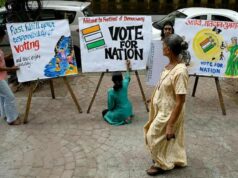Coronavirus quarantine enforced for all people entering Australia, lockdowns on the table

Space to play or pause, M to mute, left and right arrows to seek, up and down arrows for volume.
Anyone arriving in Australia from overseas will be forced to self-isolate for 14 days, while lockdown measures similar to those in place in European countries remain on the table.
The new travel measures, designed to help the Federal Government deal with the coronavirus outbreak, came into effect from midnight AEDT after being announced by Prime Minister Scott Morrison on Sunday morning.
International cruise ships are now banned from docking in Australia for the next 30 days, but arrangements will be made to get Australians home.
“In specific cases where we have Australians on cruise ships then there will be some bespoke arrangements that will be put in place directly under the command of the Australian Boarder Force to ensure the relevant protections are put in place,” he said.
Australians are also being advised to practice more “social distancing”, which includes no more handshakes.
Mr Morrison says the new advice was agreed upon at today’s National Security Committee meeting.
Penalties for those who don’t comply
The new rules, that require anyone arriving at Australia’s international airports to go straight into self-isolation for 14 days, mirror New Zealand’s measures.
The Prime Minister spoke to his New Zealand counterpart Jacinda Arden to “swap notes” before he made today’s announcement.
He insists the measures are necessary due to a growing number of cases worldwide.
“What we’ve seen in recent weeks, is more countries having issues with the virus and that means the source of some of those transmissions are coming from more and more countries,” Mr Morrison said.
Police will not be tasked with enforcing the new rules but Mr Morrison has called on the general public for their help.
“If your mate has been to Bali and they come back and they turn up at work and they are sitting next to you, they will be committing an offence, so I think it’s up to all of us to ensure that we are in ensuring this is in place,” he said.
The states and territories will determine what penalties will be issued to people who do not comply.
The 14-day self-isolation rule does not apply to flight crews.
However, they will be required to practise social distancing, such as no handshakes and limiting interaction with other people.
The exemption also applies to people from Pacific Island states transiting through Australia.
International flights will continue to operate and there are no new rules or changes to domestic flights.
‘Everything is up for consideration’
Space to play or pause, M to mute, left and right arrows to seek, up and down arrows for volume.
Chief medical officer Brendan Murphy was asked on the ABC’s Insiders program this morning if Australia was considering lockdown measures similar to those in Europe.
“It is a potential that could be the case, but that may be focal,” he said.
“One of the things we know about outbreaks of infections is they can affect one part of a country, but not the other.”
Asked if it was possible a city the size of Sydney could be locked down, he replied:
“Potentially you could,” he said.
“The Koreans did that for two provinces very successfully, locked them down, so everything is up for consideration.”
Dr Murphy also said people should keep using public transport, but that too could change.
“At the moment we are not suggesting that people should stop using public transport, but as the situation evolves, experts are meeting for a few hours and we are looking at the case numbers,” he said.
“Our social distancing measures may well change over time.
“At the moment we are ahead of the curve and moving ahead of most countries on public gatherings.”
No more handshakes
Australians are being urged to keep their hands in their pockets and remain at least 1.5 metres away from people.
The updated advice was presented to the Government today from Australia’s top medical experts.
“The Australian Health Protection Principal Committee believes that social distancing measures are now required and will need to be introduced progressively,” Mr Morrison said.
That includes no more handshakes and Federal Cabinet will now conduct its meetings via video conference so politicians are not in the same room.
Mr Morrison said MPs will be required to change the way they work and reduce interaction with the public.
“Leaders and other politicians you can expect to see not travelling as much, not engaging in as many public events. I’ve cancelled a number of events for next week,” he said.
Mass gatherings banned from Monday
Non-essential gatherings of more than 500 people will be banned from tomorrow, such as sporting games and music concerts.
The Prime Minister said the new restriction, that prevents “static non-essential static gatherings,” will be enforced by the states and territories.
“A static gathering is when you are sitting for prolonged periods,” he said.
“That would occur at a stadium, it would occur in a theatre … where people are together in close proximity for a sustained period of time.”
This does not affect schools, public transport, shopping centres, outdoor food markets or universities.
Expect more changes
The Prime Minister says there are no plans at this stage for mass school closures, but concedes further disruptions to daily life will be announced in coming weeks and months.
“We’re going to have to get used to some more changes in the way we live our lives over the next six months or so,” he said.
“There will be further intrusions, there will be further restrictions on people’s movement and their behaviour.”
Health authorities are now looking at introducing restrictions around people visiting aged care facilities, and further limits on gatherings in enclosed spaces.
A decision is expected on Wednesday.
The federal and state governments are also in conversations with the RSL and will soon release specific guidelines about Anzac Day events, particularly regarding the participation of more vulnerable members of the community.



